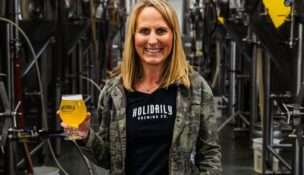Does Your Pop-Up Pop?
How to get the most attention for your wandering business
Dan Gallery //April 1, 2018//


Does Your Pop-Up Pop?
How to get the most attention for your wandering business
Dan Gallery //April 1, 2018//

Spring is in the air and that means it’s the start of pop-up season. From food trucks lined up at City Park Jazz to dozens of cocktail stands at Aspen Food & Wine, it’s no secret that pop-ups have dominated the trends in the retail, food and beverage scenes of late, and for good reason. Pop-ups offer a low cost of entry for small businesses, a flexible business plan and the ability to focus on specialty items. In addition, Denver’s not alone in its soaring real estate prices, which have driven smaller businesses and startups out of expensive shopping malls and storefronts, and into the crowds of festivals, sporting events, concerts and more. Data from Pop-Up Republic shows this industry is worth an astounding $50 billion annually – quite a meteoric rise for an industry that no one had heard of just a decade ago.
However, with the considerable growth of the industry comes inevitable saturation. What used to be a novel concept of a few ambitious entrepreneurs is now so common it feels like there is a pop-up or food truck on every corner. Another challenge is that even stalwart retailers have gotten into the pop-up game, with brands including Amazon, Budweiser and others creating pop-up stands at local events.
Amid all this competition, how does an entrepreneur make their pop-up, well, pop?
The differentiator is the experience. Utmost attention is focused on the experience of dining in restaurants: the décor, the service, the plating. This is true for pop-ups as well. Customers enjoy pop-ups because they are unique, creative and give visitors a chance to chat with the craft brewer directly, or the baker perfecting the frosting on a cupcake. Today’s customers – and particularly millennials – want a real relationship with their vendors, not a sanitized, homogenized system. Vendors can bring their personality, as well as their unique ideas to the transaction.
A successful pop-up has personality and reflects the owner and the goods sold. While requiring the right lay-out and structure – for instance, the proper venting for a grill or health-code compliant hand-washing station for food prep – the entirety of the pop-up needs the right branding, signage and service area that brings the experience together for the customer.
Another way to differentiate the experience is to consider a different type of pop-up structure. Instead of a short-term take-over of a retail space or a temporary storefront, successful pop-up owners are finding new ways to bring their goods to customers, rather than the other way around. Food trucks that roam from event to event, or even new tuk-tuk carts, which travel throughout venues, both indoors and out, are re-establishing the entire nature of pop-up retail and dining. These pop-ups elevate and compliment events people are already attending. As tuk-tuks demonstrate, it’s possible to make the cart itself the experience further distinguishing the brand.
Finally, when it comes to differentiating a pop-up, consider the venue.
Colorado’s mega events that take place in large stadiums or venues often leave little room for a small craft beverage maker or farm-to-table chef. These venues have contractual relationships with major food and beverage suppliers, meaning an independent entrepreneur has a difficult time getting attention. However, that is changing thanks to millennials who are eschewing large corporate food and seeking more fresh, culinary-level fare. Consider the addition of street tacos at Red Rocks, or the existence of craft micro-brews at Coors Field. There are opportunities for businesses that are tenacious enough to make it happen, but they had better be prepared to handle the volume – and the requirements – of the venue itself. Smart cart creation including efficient design, technological integration and high-profile signage are essential for pop-up owners who succeed in the concession big leagues.
Pop-ups are here to stay and this industry is only at its beginning. It’s a fun time to be a consumer because the experiences of shopping, eating and drinking are becoming more personal, local and specialized. Pop-up owners who find the right way to differentiate their brand and their experience will quickly dominate this exploding industry.
Dan Gallery V is the president of Gallery Carts, a Colorado company that began as a humble hot-dog stand on the 16th St. Mall almost 30 years ago and today makes mobile carts, kiosks and portables for thousands of brands worldwide. Michael Fox is the founder of eTuk USA, the exclusive U.S. manufacturer of 100 % Electric Tuk Tuk three-wheel vehicles used for green transportation, food service, and retail. Gallery and eTuk USA are partnering to reshape the mobile food and beverage industry.

























